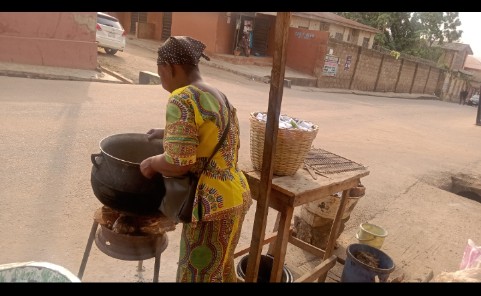According to a report by the International Finance Corporation (IFC), women-owned businesses in Nigeria face significant barriers to growth and sustainability, including limited access to finance, market constraints, and societal expectations.
Despite these challenges, women entrepreneurs continue to play a crucial role in driving economic growth and development in the country.
Statistics from the National Bureau of Statistics (NBS) reveal that women make up a significant portion of the informal sector in Nigeria, with a large percentage engaged in small-scale trading and entrepreneurship.
However, women entrepreneurs often face greater obstacles than their male counterparts, including limited access to financial resources, inadequate infrastructure, and cultural barriers.
In recent years, there has been a growing recognition of the importance of supporting women entrepreneurs in Nigeria, with initiatives aimed at providing access to finance, training, and mentorship opportunities.
Despite these efforts, women entrepreneurs continue to face significant challenges in accessing the resources and support they need to succeed.
In Osogbo, Osun state, amidst the backdrop of economic hardship, some resilient women entrepreneurs defies the odds, demonstrating the power of perseverance and innovation in the face of adversity.
Despite the challenges of rising costs and dwindling profits, moi-moi sellers like Mrs. Abiodun Ronkebunmi and Mrs. Abdulazeez Lateefat navigates the turbulent waters of entrepreneurship with unwavering determination, showcasing the resilience of Nigerian women in small business.
Mrs. Abiodun Ronkebunmi, a 50-year-old single mother of three, sees entrepreneurship not merely as a means of survival but as a profound pathway to empowerment. Despite the relentless challenges she confronts in meeting daily expenses, Mrs. Ronkebunmi adamantly refuses to succumb to despair. Instead, she steadfastly leverages her entrepreneurial spirit to carve out a brighter future for herself and her family.
In her own words, she reflected, “Despite the myriad challenges we face in managing our expenses, we persevere.
Each day presents its own set of obstacles, but we are resilient, driven by the unwavering determination to secure a better life for ourselves and our children.
Through entrepreneurship, I find not just financial sustenance, but a profound sense of purpose and empowerment. It’s not merely about surviving—it’s about thriving against all odds, charting our own course towards success and fulfillment.”
This heartfelt sentiment encapsulates Mrs. Ronkebunmi’s unwavering commitment to navigating the complexities of the market with resilience and tenacity, embodying the true essence of entrepreneurial spirit amidst adversity.
In the face of dwindling profits from her previous business ventures, Mrs. Ronkebunmi made the bold decision to transition to selling moi-moi, recognizing the potential for growth and sustainability in the market.

PC: Boluwatife Adedokun
“I was previously selling pepper, but due to the high cost of things, I changed business to selling pap and moi-moi,” she explained, highlighting her adaptability and resilience in the face of changing economic realities. Despite the initial challenges she faced in transitioning to a new business model, Mrs. Ronkebunmi persevered, leveraging her entrepreneurial skills to establish a successful moi-moi selling enterprise.
Mrs. Abdulazeez Lateefat, a seasoned entrepreneur in her 50s, exemplifies the epitome of resilience and determination in the face of adversity. With three years of experience selling nylon and moi-moi, she has weathered the storms of entrepreneurship with unwavering resolve.
In her journey, Mrs. Lateefat encountered numerous hurdles in sustaining her business. Yet, she remains anchored in her steadfast belief in divine providence, finding solace in the notion that “only God provides,” as she asserts. This profound statement echoes the depth of her faith, serving as a guiding light through the turbulent seas of entrepreneurship.
With her unwavering trust in God’s guidance, Mrs. Lateefat navigates the challenges of business ownership with grace and resilience, finding strength in her spiritual convictions to overcome obstacles and persevere through challenging times.
As Mrs. Lateefat’s story intertwines with that of Mrs. Abiodun Ronkebunmi, a fellow entrepreneur in Osogbo, a powerful narrative of perseverance and resilience emerges.
Both women embody the core principles of small business success—resilience, determination, innovation, and adaptability.
Through their keen observation of market trends and shrewd application of entrepreneurial skills, they have defied economic challenges and thrived amidst adversity.
Their stories serve as a testament to the transformative power of entrepreneurship, showcasing how individuals can rise above adversity to carve out a path of success and financial independence.
As Mrs Lateefat demonstrated, the journey of entrepreneurship is not merely about overcoming obstacles—it’s about embracing challenges as opportunities for growth, innovation, and ultimately, triumph.
Expert react
Isioma Faustina Odita, a dedicated professional with a passion for education and gender equality, shares insights on supporting local businesswomen and addressing gender disparities in entrepreneurship:
“Local business women can be supported by the government through various initiatives such as providing access to funding and grants specifically tailored to women entrepreneurs, offering training and mentorship programs, creating networking opportunities, ensuring equal access to government contracts and procurement opportunities, and implementing policies that promote work-life balance and support for childcare.”
“Despite the government’s efforts, there are still significant disparities in the opportunities available to local business women compared to their male counterparts. Women face various challenges such as limited access to capital, gender bias in business financing, unequal access to networks and mentorship, and societal expectations regarding family and caregiving responsibilities.”
“The Nigerian government has taken various initiatives to support local business women. However, to enhance support, the government could consider strengthening access to finance, enhancing business support services, promoting gender equality in procurement, addressing cultural and societal barriers, and enforcing policies against gender discrimination.”
“To promote greater awareness of the challenges facing local businesswomen, strategies such as education and advocacy, media coverage, collaboration and partnerships, research and data collection, and engaging men as allies can be implemented.”




